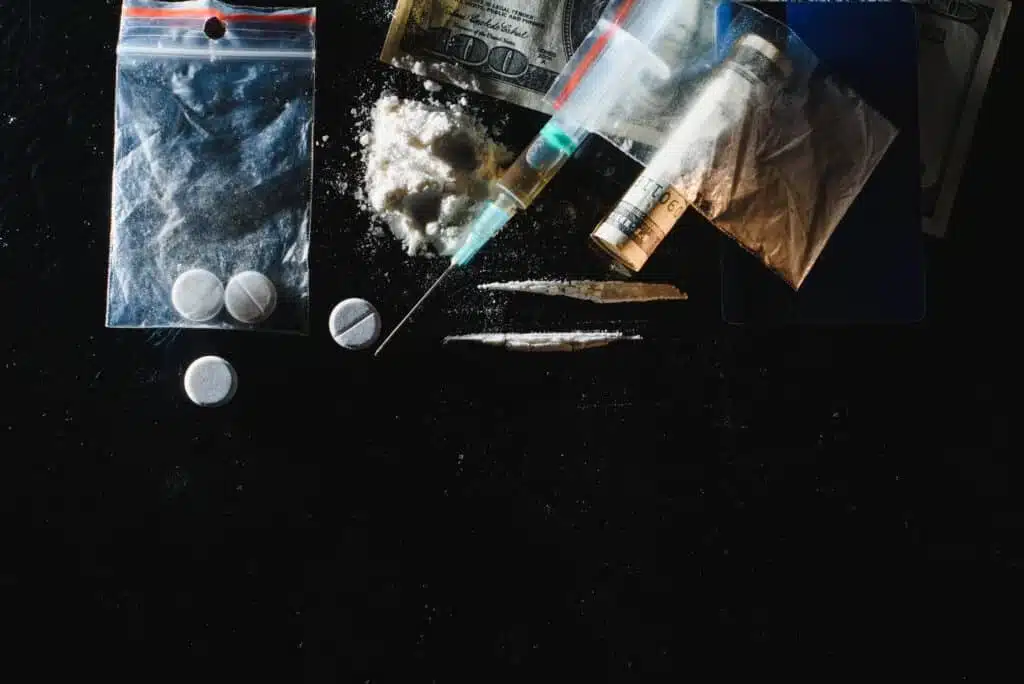1. Drug possession can be a misdemeanor or a felony.
Depending on the circumstances surrounding the crime, drug possession can be classed as either a misdemeanor or a felony. Factors that play a role in the charges include the type and quantity of drug involved, any aggravating circumstances, and the defendant’s criminal history.
Colorado classifies drugs into “Schedules” depending on whether they are used in a medical setting and how addictive they are, with Schedule I drugs having the highest potential for abuse and the least medical necessity. Schedule V drugs, on the other hand, are seen as medically useful and pose a relatively low risk of dependence.
In most cases, possession of Schedule III, IV or V drugs will result in a misdemeanor rather than a felony charge. In addition, it is now a misdemeanor rather than a felony to be found in possession of up to 4 grams of several Schedule I and II narcotics, including cocaine, ecstasy, heroin, and methamphetamine.
2. Intent to distribute carries harsher penalties than simple possession.
While Colorado may have eased up on several simple possession charges as of late, possession with intent to distribute carries much harsher penalties. Intent to distribute is typically assessed based on evidence found at the scene of the crime. This can include a large quantity of drugs exceeding what would be considered typical for personal use, instruments that could be used to package the drugs for sale (baggies, scales, containers, etc.), or large amounts of cash.
3. There are limits on the amount of marijuana you can legally possess in Colorado.
Although Colorado has legalized marijuana for recreational use, there are still restrictions on this drug that you should be aware of. First and foremost, adults over the age of 21 are only permitted to have up to 2 ounces of marijuana for personal use at any given time.
In addition, contrary to popular belief, public consumption of marijuana is NOT legal in Colorado. Consumption of less than 2 ounces in public can be classed as a petty offense. Consumption of more than this amount can be charged as possession (Level 1 or Level 2 misdemeanor). Lastly, driving under the influence of marijuana is a serious offense, punishable as a DUI or DWAI.
4. Psilocybin has been decriminalized in the state of Colorado.
In November 2022, Colorado voters approved Proposition 122 to decriminalize psilocybin mushrooms. The state is now in the process of launching a more robust psychedelics industry, with regulations similar to what is in place for marijuana dispensaries. But, in the meantime, the state has removed penalties for using and sharing (but not selling) psilocybin mushrooms among adults ages 21 and up.
5. There are drug diversion programs available in Colorado.
Drug diversion programs are now available for many individuals facing drug possession charges in the state of Colorado, reflecting the state’s increasing focus on rehabilitation over punishment. In simple terms, entry into a diversion program acts as an alternative to a criminal trial. Doing so does not require you to plead guilty to any criminal charges.
This is an excellent incentive for individuals who are struggling with drug use to get into treatment. If you do successfully complete a diversion program, the charges against you will be dismissed and will not appear on your record. You can also petition the court to seal the arrest record, along with the records of any related proceedings.
Note that not everyone is eligible for these programs. Factors such as the type and quantity of drug involved, the circumstances surrounding the arrest, and the defendant’s criminal history can impact eligibility. If you are unsure of whether you qualify for a diversion program, a skilled drug possession lawyer can help guide you through the process.
Looking for a Denver drug crime lawyer near you? MBS Law can help.
We want to emphasize that just because Colorado may be known as a more lenient state when it comes to drug possession does NOT mean that drug charges should be taken lightly. If you are facing drug possession charges in Colorado, turn to experienced Denver drug crime defense attorneys for help. An expert legal team understands the types of drug charges individuals most commonly face and how to combat them most effectively.
Mastro, Barnes & Stazzone, P.C. (MBS Law) can support you no matter the specifics of your case. Contact us today to get started with a FREE consultation, and let’s get you the help you deserve.



